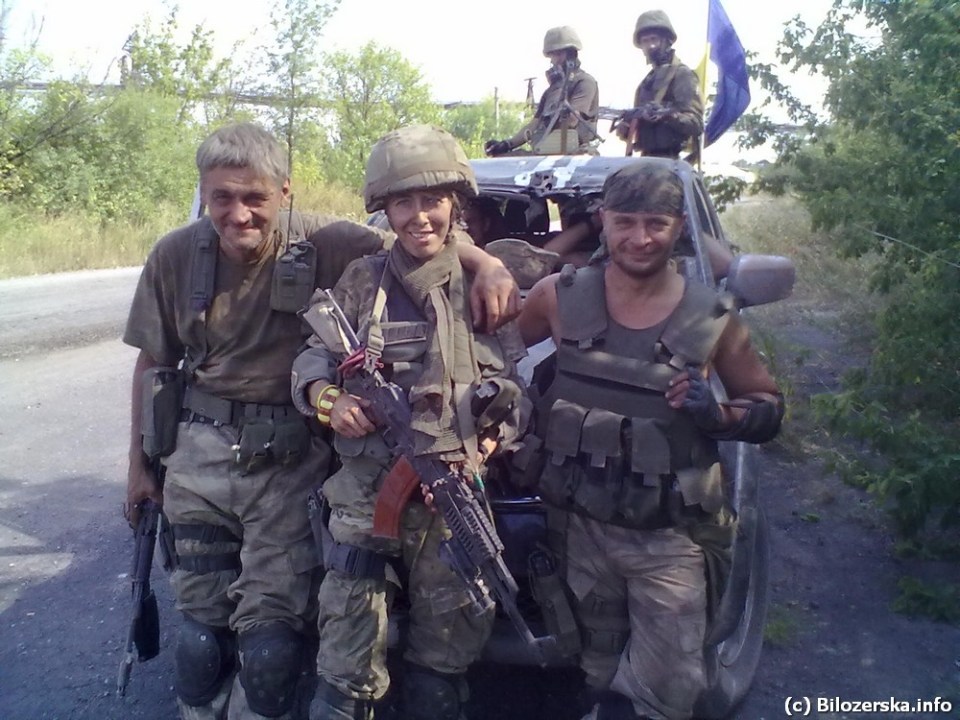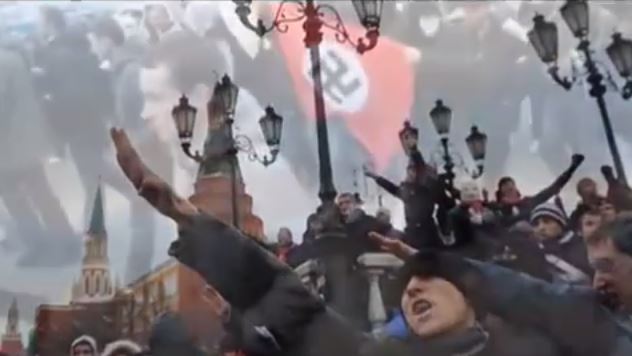By Olena Bilozerska
“I had spent most of my time close to the bomb shelters, so that I could jump into them as soon as I heard the sound of the shells. Ordinary cellars in homes work not too badly against mortars, but they would become a Common grave against the “hrad” missiles. So in other words, being there was more than a little nerve wracking.
The ever-resourceful soldiers would spend their nights as sentinels, and if not on guard duty, they would sleep in houses, hiding in bunkers only when the missiles could be heard exploding close by.
Not me. I didn’t trust my untrained ears, and so I was habitually sleeping in hiding places. I slept surprisingly well, only to have my dreams interrupted by the regimented sounds of explosions, ‘Boo, boo, boo, boo, boo, kaboom.’ ‘Another hrad just exploded,’ someone beside me would say, after which I would go back to sleep.
The ‘little green men’ were all around the town, Manning their mortars. Intelligence gathering patrols and combat patrols walked around at night as if they were at home. Our groups hunted theirs, and they hunted ours.
There was one particularly fierce battle that erupted after my arrival. Two of our best units suffered losses. Some of our Pick up trucks were damaged, with explosions breaking the windshield. Human losses included injuries of various degrees of severity, though no one was killed.
When the vehicle carrying the wounded managed to escape the battle, they did so virtually on two functioning wheels. Nonetheless they kept their wits about them and managed to bring a wounded soldier safely to our medics. They gave assistance to everyone who needed it, and evacuated all the wounded. “It was in the second unit that the fatal casualties were suffered, namely the commander of the scouts, Shershyn.
We provided medical attention to the wounded when they stopped, while our soldiers did a spot check on a civilian vehicle that had managed to drive into the village. The occupants were a young family with a small boy, refugees from Yenakiyevyi, who had hired a taxi at great cost to take them to safety. No sooner had we established their identity and where they were from, and just as our pick-up truck with the wounded drove away, a shell was fired in our direction. Their spotters had noticed us at the gates, and had hid themselves when they saw the wounded being brought in. We all managed to reach safety, including our new-found civilians. The young woman couldn’t keep from crying, but her small child kept his composure, and even ate the food we offered to him.
This family explained their intention to reach Rostov, where they had family. So far they were able to find safe routes toward the border. We explained to them that from here on in there would not be any such thing. I was intent on convincing them that inasmuch as they had a young child with them, the first thing they needed to do was get somewhere where there was no shooting. Their best plan would be to wait for a lull in the shelling and head in the other direction, further into Ukraine, which is what the majority of the refugees are now doing, especially those with children.
My advice was that they could always fly to Russia later from Kyiv. Even if they were to be stranded somewhere, they were young and would somehow be able to manage. Many good people are willing to help refugees. I even offered to use the internet to contact friends of mine in various places around Ukraine, so that no matter where they happened to find themselves, I could arrange for temporary accommodation and support for them. Unfortunately, they had other ideas. As soon as things quieted down outside, they set their minds to reaching Russia from another entry point. I pray to God that they made it.
There also lived two prisoners of the Donetsk People’s republic army, (DNR), at our temporary control centre. One man, a veteran of Afghanistan, was a very capable sapper. When he realized that he had been taken prisoner by Pravyi Sektor, he nearly died of fright. It’s incredible what wild thoughts go through their minds, as the reality is that we treated them fairly, we never hit them, fed them well, and allowed them proper hygiene. These prisoners are still with us. They work for us, and in the future could either become part of a prisoner exchange, or simply released at the end of the war.
Before I went to Savur-mohyla, I left messages telling people that I would be away from all communications for some time. I also asked for prayers for my safety and also for those with me, that we all return alive. It so happened that a day and a half into my stay at Stepanivka, a large military column arrived, and so we were given orders for other assignments. Once again I had quite the lively trip, this time into the most dangerous of situations, and of course in the most rickety of vehicles. We had to stop and wait several times, as it wouldn’t have been right to get too far ahead of the rest of our soldiers.
A mere twelve hours after our departure from Donetsk province’s village of Stepanivka, it was obliterated by a divisional scale shelling of “hrad” missiles. They were fired from Russian territory. I am afraid even to think about what happened to the military column we had seen, or to the civilians I know had stayed behind.
In that village there also lived animals, cats, dogs, geese, and ducks who were managing on their own. I remember how many kittens I had seen. Their owners had left them alive before they fled. Our soldiers and others from the army looked after them for the week they were there. One black cat reminded me of my cat, Vatnyk, his short tail the result of some accident. My intention was to take him with me and find a place for him, but the men discouraged that, saying the cats would be fine, and that they would feed them, and they’ll be content. But now, it’s possible that they have all perished….
P.S. The most vivid memory I have from that place is not the shelling, and not even the dead and the wounded, but rather a bottle of champagne that had been found by our soldiers in a cellar. It was a “wedding champagne”, sporting a portrait of a young married couple. They were married last fall. On the label it was written, “Best to drink on 5 October, 2014, our first anniversary.” Turning over the bottle in his hands, our commander, Letun, commented sadly, “And why couldn’t they have lived in peace?’”













[hr]Source: bilozerska.livejournal.com, translated by Jeffrey D. Stephaniuk








